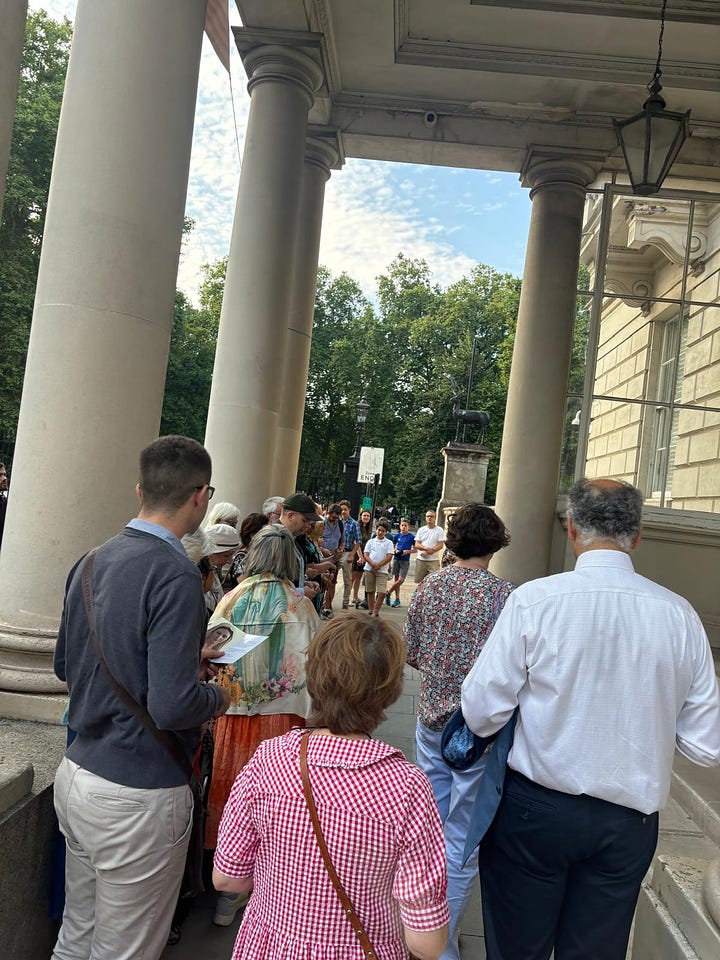Reparation for blasphemy – papal teaching on its necessity
English Catholics gathered at the French Consulate in London, saying the rosary in reparation for the Paris blasphemies, and putting into action clear papal teaching on this necessity.
Rosary of Reparation
We were in two minds about whether to speak at all about what happened in Paris at the end of July, thinking that it might be best to starve such blasphemy of attention.
The creatures responsible for such blasphemy evidently thrive upon the outrage and attention of Christians.
In some ways, they even benefit from this outrage: after all, it provides them with free publicity. and it’s well known that “there’s no such thing as bad publicity.” Many find it tempting to share videos and images of such events with each other, and to ask, “Can you believe this?”
The same thing occurs from time to time when so-called conservative influencers respond to the latest filthy music by reading them aloud on their shows. We sully ourselves by sharing such things. After all, St Paul said:
But fornication and all uncleanness or covetousness, let it not so much as be named among you, as becometh saints:
Or obscenity or foolish talking or scurrility, which is to no purpose: but rather giving of thanks. (Eph. 5.3-4)
The same clearly applies, to some degree, to these images of this blasphemous event.
However, there is an objective social disorder created by such blasphemy. St Thomas wrote that blasphemy is a very great sin, a kind of unbelief which is aggravated by hatred of God. He compares it to murder in the following way:
‘If we compare murder and blasphemy as regards the objects of those sins, it is clear that blasphemy, which is a sin committed directly against God, is more grave than murder, which is a sin against one’s neighbour.
‘On the other hand, if we compare them in respect of the harm wrought by them, murder is the graver sin, for murder does more harm to one’s neighbour, than blasphemy does to God.
‘Since, however, the gravity of a sin depends on the intention of the evil will, rather than on the effect of the deed, as was shown above (I-II Q73.8), it follows that, as the blasphemer intends to do harm to God’s honour, absolutely speaking, he sins more grievously than the murderer.’ (II-II Q13.4)1
The social disorder and guilt caused by the sin of blasphemy – especially when it is perpetrated by those responsible for governing the community – must be rectified, both as a matter of justice to God, and as a matter of urgency for society.
This is because collective responsibility can sometimes be incurred by the social body through the crimes of its head, or through the crimes of such a number of its members as to constitute an act of the whole body. As such, the sins of leaders of a society cam have implications for the members.
St Thomas explains:
‘[A]ll men born of Adam may be considered as one man, inasmuch as they have one common nature, which they receive from their first parents; even as in civil matters, all who are members of one community are reputed as one body, and the whole community as one man. […] Accordingly the multitude of men born of Adam, are as so many members of one body.’ (I-II Q. 81.1)
This text explains why it is that a community – which is a ‘reputed as one body, and the whole community as one man’ – may be justly punished together with measures like an interdict (or economic sanctions, etc.) for crimes committed by the nation as a whole or by its leaders.
For the same reason, as we have seen many times throughout history, the just God may well choose to punish such a community that provokes him with egregious sin and blasphemy – unless the injury done to him can be repaired.
This is what is meant by “reparation.”
But can we really offer restitution for sins against the infinite God?
Is reparation even possible?
In a certain sense, the debt of sin is infinite – because of the infinite dignity of God, the person against whom sin is ultimately directed. St Thomas writes:
‘[A] sin which is committed against God, is infinite: because the gravity of a sin increases according to the greatness of the person sinned against (thus it is a more grievous sin to strike the sovereign than a private individual), and God’s greatness is infinite.
‘Therefore an infinite punishment is due for a sin committed against God.’ (Ia IIae, Q87 A4 Obj. 2)2
No finite man (or group of men) is able to make restitution for such a sin. St Thomas writes:
‘[N]o penalty endured could man pay [God] enough satisfaction [for the debt of sin.]’ (ST III Q47 A3)
There are two points which we must notice here.
The first is that our radical inability to make an adequate restitution for sin – whether our own or for another’s – does not thereby remove the obligation to try to make such restitution. We are obliged at least to make an attempt at restitution, and at repairing the disorder, injustice and guilt of public blasphemy.
The second is that, through his own goodness, God himself gave our race the means of making atonement for sin – which was achieved through the passion of Christ – a divine person with both a divine nature and an assumed human nature.
By assuming our human nature, Christ was able to offer a sacrifice to God as one of us, as man. This sacrifice was of infinite value, “inasmuch as it was God’s flesh” that suffered, and inasmuch as he endured this extreme suffering out of perfect obedience and exceeding love for God (ST III Q48 A2). In so doing, justice was perfectly fulfilled, because our otherwise unpayable debt was paid in full; and yet also in so doing, God manifested his great love and mercy for our fallen race.
But in fact, Christ did not redeem our race by paying our debt in merely a “sufficient” way, but rather in “superabundant” way which gives us the means to make supernatural acts, which are meritorious to the degree that they are united to the passion and animated by supernatural charity.
Such acts – always drawing their value from Christ’s passion, grace and supernatural charity – are indeed capable of being more pleasing to God than blasphemy and other sins are offensive to him.
Because of this, it is truly possible to make reparation for sin. Of the attempt to offer reparation, Pius XI wrote in a 1928 encyclical:
‘[T]he just and merciful God who would have spared Sodom for the sake of ten just men, will much more be ready to spare the whole race of men, when He is moved by the humble petitions and happily appeased by the prayers of the community of the faithful praying together in union with Christ their Mediator and Head, in the name of all.’ (Miserentissimus Redemptor)
The example of Sodom shows that, just as the sins of leaders or a number of individuals affects society as a whole, so can the reparation made by some do the same.
English Catholics making reparation at London’s French Consulate
We are happy to share the news that friends of ours went to the French Consulate in London for this very purpose, of making reparation for the Paris blasphemies. About 50 Catholics gathered for this public act of witness.
Here is the speech from the event:
Statement made at the Rosary of Reparation on 2 August 2024
‘We're here because last week in Paris, for the opening ceremony of the Olympics, we saw one of the most brazen examples of blasphemy in living memory.
‘[It was a] complete mockery of the last supper, wherein our Lord Jesus Christ instituted the Eucharist, a sacrament of complete intimate union with our Lord himself – something so holy and pure, something that bestows so much grace upon its worthy recipients, and something they clearly hate!
‘Especially in the face of such silence from our supposed Catholic hierarchs, it's imperative that Catholics make reparation for such blatant acts of blasphemy, for something that was nothing short of an occult luciferian ceremony.
‘So today, we offer up the Rosary in union with countless other Catholics throughout Europe, in reparation for the outrages, sacrileges and blasphemies of this world and in honour of Christ the King, true King of this World.’




Pope Pius XI said of souls such as those at this event:
‘[W]hosoever of the faithful have piously pondered on all these things must need be inflamed with the charity of Christ in His agony and make a more vehement endeavour to expiate their own faults and those of others, to repair the honor of Christ, and to promote the eternal salvation of souls.’
As the speech says, few of of the supposed members of the Catholic hierarchy have spoken out about this event – it falling, once again, to the traditional Catholic laity to organise a response.
Most conspicuous by his silence, however, was Francis himself. Many were surprised by Francis’ silence for over a week, but in some ways the statement is worse than silence:
The Holy See was saddened by certain scenes at the opening ceremony of the Paris Olympic Games, and can only join the voices that have been raised in recent days to deplore the offence caused to many Christians and believers of other religions.
In a prestigious event where the whole world gathers around common values, there should be no allusions ridiculing the religious convictions of many people.
Freedom of expression, which of course is not in question, finds its limit in respect for others.
Much of the commentary on this event has turned around the offence that such blasphemy has caused to Christians. While focusing on the offence caused to Christians – and “to all people of faith” and to “believers of other religions” – might be somewhat appropriate when dealing with those who reject Christ, the offence caused to God himself is far more significant.
To illustrate what could have been said by a true pope in response to public blasphemy against the Son of God and Redeemer of the human race, we are including below some extracts from Pius XI’s 1928 encyclical Miserentissimus Redemptor.
It could have been written this very week, and something similar would have been written last week if we had a true pope, who had any concern for God’s honour.
We should all take note of his teaching and at least offer private prayers of reparation.
Miserentissimus Redemptor
Pius XI’s 1928 Encyclical
On Reparation to the Sacred Heart
Our Most Merciful Redeemer, after He had wrought salvation for mankind on the tree of the Cross and before He ascended from out this world to the Father, said to his Apostles and Disciples, to console them in their anxiety, “Behold I am with you all days, even to the consummation of the world.” (Matt. xxviii, 20).
These words, which are indeed most pleasing, are a cause of all hope and security, and they bring us, Venerable Brethren, ready succour, whenever we look round from this watch-tower raised on high and see all human society labouring amid so many evils and miseries, and the Church herself beset without ceasing by attacks and machinations.
For as in the beginning this Divine promise lifted up the despondent spirit of the Apostles and enkindled and inflamed them so that they might cast the seeds of the Gospel teaching throughout the whole world; so ever since it has strengthened the Church unto her victory over the gates of hell.
In sooth, Our Lord Jesus Christ has been with his Church in every age, but He has been with her with more present aid and protection whenever she has been assailed by graver perils and difficulties. For the remedies adapted to the condition of time and circumstances, are always supplied by Divine Wisdom, who reacheth from end to end mightily, and ordereth all things sweetly (Wisdom viii, 1).
But in this latter age also, “the hand of the Lord is not shortened” (Isaias lix, 1), more especially since error has crept in and has spread far and wide, so that it might well be feared that the fountains of Christian life might be in a manner dried up, where men are cut off from the love and knowledge of God. […]
The Sacred Heart
Among the many proofs of the boundless benignity of our Redeemer, there is one that stands out conspicuously, to wit the fact that when the charity of Christian people was growing cold, the Divine Charity itself was set forth to be honoured by a special worship, and the riches of its bounty was made widely manifest by that form of devotion wherein worship is given to the Most Sacred Heart of Jesus, “In whom are hid all the treasures of wisdom and knowledge” (Coloss. ii, 3). […]
For is not the sum of all religion and therefore the pattern of more perfect life, contained in that most auspicious sign and in the form of piety that follows from it inasmuch as it more readily leads the minds of men to an intimate knowledge of Christ Our Lord, and more efficaciously moves their hearts to love Him more vehemently and to imitate Him more closely? […]
The Sacred Heart and a spirit of reparation
And truly the spirit of expiation or reparation has always had the first and foremost place in the worship given to the Most Sacred Heart of Jesus, and nothing is more in keeping with the origin, the character, the power, and the distinctive practices of this form of devotion, as appears from the record of history and custom, as well as from the sacred liturgy and the acts of the Sovereign Pontiffs.
For when Christ manifested Himself to Margaret Mary, and declared to her the infinitude of His love, at the same time, in the manner of a mourner, He complained that so many and such great injuries were done to Him by ungrateful men — and we would that these words in which He made this complaint were fixed in the minds of the faithful, and were never blotted out by oblivion:
“Behold this Heart” — He said — “which has loved men so much and has loaded them with all benefits, and for this boundless love has had no return but neglect, and contumely, and this often from those who were bound by a debt and duty of a more special love.”
In order that these faults might be washed away, He then recommended several things to be done, and in particular the following as most pleasing to Himself, namely that men should approach the Altar with this purpose of expiating sin, making what is called a Communion of Reparation, — and that they should likewise make expiatory supplications and prayers, prolonged for a whole hour, –which is rightly called the “Holy Hour.”
These pious exercises have been approved by the Church and have also been enriched with copious indulgences.
What is the point of reparation today?
But how can these rites of expiation bring solace now, when Christ is already reigning in the beatitude of Heaven?
To this we may answer in some words of St. Augustine which are very apposite here, “Give me one who loves, and he will understand what I say” (In Johannis evangelium, tract. XXVI, 4).
For any one who has great love of God, if he will look back through the tract of past time may dwell in meditation on Christ, and see Him laboring for man, sorrowing, suffering the greatest hardships, “for us men and for our salvation,” well-nigh worn out with sadness, with anguish, nay “bruised for our sins” (Isaias liii, 5), and healing us by His bruises.
And the minds of the pious meditate on all these things the more truly, because the sins of men and their crimes committed in every age were the cause why Christ was delivered up to death, and now also they would of themselves bring death to Christ, joined with the same griefs and sorrows, since each several sin in its own way is held to renew the passion of Our Lord: “Crucifying again to themselves the Son of God, and making him a mockery” (Hebrews vi, 6).
Now if, because of our sins also which were as yet in the future, but were foreseen, the soul of Christ became sorrowful unto death, it cannot be doubted that then, too, already He derived somewhat of solace from our reparation, which was likewise foreseen, when “there appeared to Him an angel from heaven” (Luke xxii, 43), in order that His Heart, oppressed with weariness and anguish, might find consolation.
And so even now, in a wondrous yet true manner, we can and ought to console that Most Sacred Heart which is continually wounded by the sins of thankless men, since – as we also read in the sacred liturgy – Christ Himself, by the mouth of the Psalmist complains that He is forsaken by His friends:
“My Heart hath expected reproach and misery, and I looked for one that would grieve together with me, but there was none: and for one that would comfort me, and I found none” (Psalm Ixviii, 21).
Reparation and the Church as Christ’s mystical body
To this it may be added that the expiatory passion of Christ is renewed and in a manner continued and fulfilled in His mystical body, which is the Church.
For, to use once more the words of St. Augustine,
“Christ suffered whatever it behoved Him to suffer; now nothing is wanting of the measure of the sufferings. Therefore the sufferings were fulfilled, but in the head; there were yet remaining the sufferings of Christ in His body” (In Psalm Ixxxvi).
This, indeed, Our Lord Jesus Himself vouchsafed to explain when, speaking to Saul, “as yet breathing out threatenings and slaughter” (Acts ix, 1), He said, “I am Jesus whom thou persecutest” (Acts ix, 5), clearly signifying that when persecutions are stirred up against the Church, the Divine Head of the Church is Himself attacked and troubled.
Rightly, therefore, does Christ, still suffering in His mystical body, desire to have us partakers of His expiation, and this is also demanded by our intimate union with Him, for since we are “the body of Christ and members of member” (1 Corinthians xii, 27), whatever the head suffers, all the members must suffer with it (Cf. 1 Corinthians xii, 26).
The absolute necessity of reparation in the modern era of apostasy
Now, how great is the necessity of this expiation or reparation, more especially in this our age, will be manifest to every one who, as we said at the outset, will examine the world, “seated in wickedness” (1 John v, 19), with his eyes and with his mind.
For from all sides the cry of the peoples who are mourning comes up to us, and their princes or rulers have indeed stood up and met together in one against the Lord and against His Church (Cf. Psalm ii, 2).
Throughout those regions indeed, we see that all rights both human and Divine are confounded. Churches are thrown down and overturned, religious men and sacred virgins are torn from their homes and are afflicted with abuse, with barbarities, with hunger and imprisonment; bands of boys and girls are snatched from the bosom of their mother the Church, and are induced to renounce Christ, to blaspheme and to attempt the worst crimes of lust; the whole Christian people, sadly disheartened and disrupted, are continually in danger of falling away from the faith, or of suffering the most cruel death.
These things in truth are so sad that you might say that such events foreshadow and portend the “beginning of sorrows,” that is to say of those that shall be brought by the man of sin, “who is lifted up above all that is called God or is worshipped” (2 Thessalonians ii, 4).
Reparation also to be made for our fellow Christians - and for the problems which they face
But it is yet more to be lamented, Venerable Brethren, that among the faithful themselves, washed in Baptism with the blood of the immaculate Lamb, and enriched with grace, there are found so many men of every class, who labouring under an incredible ignorance of Divine things and infected with false doctrines, far from their Father’s home, lead a life involved in vices, a life which is not brightened by the light of true faith, nor gladdened by the hope of future beatitude, nor refreshed and cherished by the fire of charity; so that they truly seem to sit in darkness and in the shadow of death.
Moreover, among the faithful there is a greatly increasing carelessness of ecclesiastical discipline, and of those ancient institutions on which all Christian life rests, by which domestic society is governed, and the sanctity of marriage is safeguarded; the education of children is altogether neglected, or else it is depraved by too indulgent blandishments, and the Church is even robbed of the power of giving the young a Christian education; there is a sad forgetfulness of Christian modesty especially in the life and the dress of women; there is an unbridled cupidity of transitory things, a want of moderation in civic affairs, an unbounded ambition of popular favour, a depreciation of legitimate authority, and lastly a contempt for the word of God, whereby faith itself is injured, or is brought into proximate peril.
But all these evils as it were culminate in the cowardice and the sloth of those who, after the manner of the sleeping and fleeing disciples, wavering in their faith, miserably forsake Christ when He is oppressed by anguish or surrounded by the satellites of Satan, and in the perfidy of those others who following the example of the traitor Judas, either partake of the holy table rashly and sacrilegiously, or go over to the camp of the enemy.
And thus, even against our will, the thought rises in the mind that now those days draw near of which Our Lord prophesied: “And because iniquity hath abounded, the charity of many shall grow cold” (Matth. xxiv, 12).
The obligation of anyone who loves Christ
Now, whosoever of the faithful have piously pondered on all these things must need be inflamed with the charity of Christ in His agony and make a more vehement endeavour to expiate their own faults and those of others, to repair the honor of Christ, and to promote the eternal salvation of souls.
And indeed that saying of the Apostle: “Where sin abounded, grace did more abound” (Romans v, 20) may be used in a manner to describe this present age; for while the wickedness of men has been greatly increased, at the same time, by the inspiration of the Holy Ghost, a marvellous increase has been made in the number of the faithful of both sexes who with eager mind endeavour to make satisfaction for the many injuries offered to the Divine Heart, nay more they do not hesitate to offer themselves to Christ as victims.
For indeed if any one will lovingly dwell on those things of which we have been speaking, and will have them deeply fixed in his mind, it cannot be but he will shrink with horror from all sin as from the greatest evil, and more than this he will yield himself wholly to the will of God, and will strive to repair the injured honour of the Divine Majesty, as well by constantly praying, as by voluntary mortifications, by patiently bearing the afflictions that befall him, and lastly by spending his whole life in this exercise of expiation.
Reparation and the feast of the Sacred Heart
These things being so, Venerable Brethren, just as the rite of consecration, starting from humble beginnings, and afterwards more widely propagated, was at length crowned with success by Our confirmation; so in like manner, we earnestly desire that this custom of expiation or pious reparation, long since devoutly introduced and devoutly propagated, may also be more firmly sanctioned by Our Apostolic authority and more solemnly celebrated by the whole Catholic name.
Wherefore, we decree and command that every year on the Feast of the Most Sacred Heart of Jesus — which feast indeed on this occasion we have ordered to be raised to the degree of a double of the first class with an octave — in all churches throughout the whole world, the same expiatory prayer or protestation as it is called, to Our most loving Saviour, set forth in the same words according to the copy subjoined to this letter shall be solemnly recited, so that all our faults may be washed away with tears, and reparation may be made for the violated rights of Christ the supreme King and Our most loving Lord.
The great goods to be won for the Church and souls by reparation
There is surely no reason for doubting, Venerable Brethren, that from this devotion piously established and commanded to the whole Church, many excellent benefits will flow forth not only to individual men but also to society, sacred, civil, and domestic, seeing that our Redeemer Himself promised to Margaret Mary that “all those who rendered this honour to His Heart would be endowed with an abundance of heavenly graces.”
Sinners indeed, looking on Him whom they pierced (John xix, 37), moved by the sighs and tears of the whole Church, by grieving for the injuries offered to the supreme King, will return to the heart (Isaias xlvi, 8), lest perchance being hardened in their faults, when they see Him whom they pierced “coming in the clouds of heaven” (Matth. xxvi, 64), too late and in vain they shall bewail themselves because of Him (Cf. Apoc. i, 7).
But the just shall be justified and shall be sanctified still (Cf. Apoc. xxii. 11) and they will devote themselves wholly and with new ardor to the service of their King, when they see Him contemned and attacked and assailed with so many and such great insults, but more than all will they burn with zeal for the eternal salvation of souls when they have pondered on the complaint of the Divine Victim: “What profit is there in my blood?” (Psalm xxix, 10), and likewise on the joy that will be felt by the same Most Sacred Heart of Jesus “upon one sinner doing penance” (Luke xv, 10).
And this indeed we more especially and vehemently desire and confidently expect, that the just and merciful God who would have spared Sodom for the sake of ten just men, will much more be ready to spare the whole race of men, when He is moved by the humble petitions and happily appeased by the prayers of the community of the faithful praying together in union with Christ their Mediator and Head, in the name of all.
And now lastly may the most benign Virgin Mother of God smile on this purpose and on these desires of ours; for since she brought forth for us Jesus our Redeemer, and nourished Him, and offered Him as a victim by the Cross, by her mystic union with Christ and His very special grace she likewise became and is piously called a reparatress.
Read Next:
HELP KEEP THE WM REVIEW ONLINE!
As we expand The WM Review we would like to keep providing free articles for everyone. If you have benefitted from our content please do consider supporting us financially.
A subscription from you helps ensure that we can keep writing and sharing free material for others.
Plus, you will get exclusive access to our weekly Editors’ Updates!
Thank you!
St Thomas does clarify, however that ‘[n]evertheless murder takes precedence, as to punishment, among sins committed against our neighbor.’
While this text is found in an objection to the thesis of the given question, St Thomas accepts the terms as being relevant to one aspect of sin, namely the turning away from the infinite good, which is God. This is made explicit in the response, which itself refers back to the body of the answer:
“Punishment is proportionate to sin. Now sin comprises two things. First, there is the turning away from the immutable good, which is infinite, wherefore, in this respect, sin is infinite. Secondly, there is the inordinate turning to mutable good. In this respect sin is finite, both because the mutable good itself is finite, and because the movement of turning towards it is finite, since the acts of a creature cannot be infinite.”







